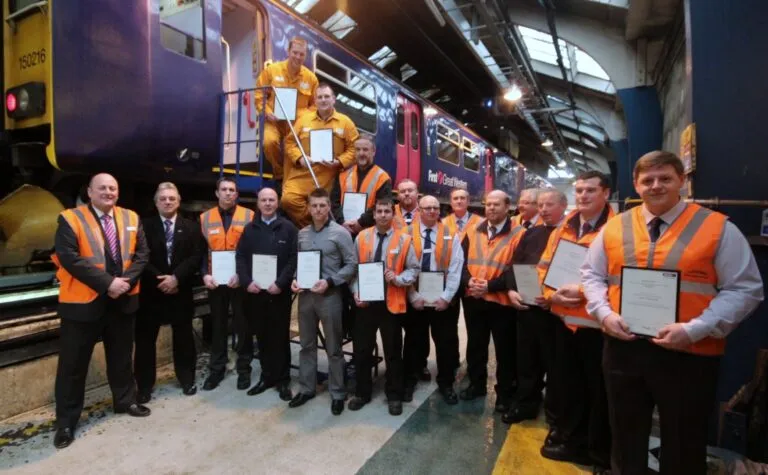Qualitrain’s Managing Director, Leon Bowler, provides an honest account of the challenges the company has faced throughout the COVID-19 pandemic, how they’ve been overcome and our new way of working.
I doubt there’s a single person in this country that will forget what happened during March 2020. A sudden grinding halt to everyone’s daily lives arguably causing widespread panic and confusion… well it did if you measured it using the amount of toilet rolls left!
Those of us who understand Maslow’s Hierarchy of Needs saw signs of it in action all around us. Some people who were self-actualising and realising their potential had now lost their livelihood; crashing all the way down because the basic securities that so many of us are used to were now under threat. This is something that most people have never really experienced and understandably, there wasn’t much else on the radar.
Qualitrain were hit hard by the lockdown and saw revenues drop by over two thirds in two weeks! This was serious survival mode stuff but what were we going to do? I’ve learned over the years that you can either roll over, or roll up your sleeves – and that’s exactly what we did. It was time to bare arms (forgive the pun), however hard times have a habit of bringing out the best in people.
Action Plan
First things first; what was our new Takt time? In education we know this as the average number of learners that need to be educated each day. This had dropped by over 60%! The team did a great job of quickly identifying which customers could continue. From there, we confirmed the correct resource levels and aligned our capacity planning. At the same time, our support functions did a great job and managed to hoover up as much cash as possible to ensure we could pay our bills. The last part of the puzzle was to utilise the furlough scheme to protect jobs. It was now time to let the team know.

I’ve always had a firm belief that a leader should do things with their team and not to their team.
As well as the usual email briefs and management reports, we took the time to speak to everyone individually, not talking about work but talking about them and their loved ones. It was important to help everyone manage their fears, help them to remain calm and think critically in the face of uncertainty. The last important decision taken was to ensure the team was paid in full. We couldn’t keep this up for the whole duration of the pandemic – who was to know it would go on for so long? However, initially it was decided that we would do everything we could to help and that was to make sure our team didn’t have to worry about money. It was now time to strategise!
I’m sure many of you have done the strategy tools to death! I think if I ever see another SWOT analysis PowerPoint again, I’m going to explode! But having stabilised the ship it was now time to steer it to safe waters. By quickly scanning the macro environment it became very clear that we were in trouble, big, big trouble. Nearly all of our training was carried out at Gemba, a real place, but we could no longer do this due to the lockdown rules. Along with everyone else we were going to have to evolve quickly and find a way to teach improvement in a digital world. To do this, the SMT worked quickly over several days and reset our strategy deployment. After another quick-fire round of communication, it was time to crack on.
So, what next?
Over the next 6-months Qualitrain changed pretty much everything. From the e-learning platforms through to the resources and practical activities we use to teach and coach. Everything had to be redone and we couldn’t just buy it in. There was no way that was going to work, we couldn’t afford it. I have to admit that, without the support of the whole team and our IT partners, we couldn’t have done it. Even though when we started teaching online it was a bit of a disaster! We even lost a customer and the feedback was pretty scathing, however we continued to press on. We experimented daily, stopping to fix problems as quickly as possible, listening to our customer feedback and most importantly never giving up!
It’s now over a year on from the start of the pandemic and I can barely recognise the way we work on a daily basis. The opportunities technology has provided enabled Qualitrain to teach effectively both online and face to face. We have instantaneous customer feedback which now shows that over 80% of our customers rate us between 8 and 10 out of 10!
We were nowhere near these kind of numbers before the pandemic. In fact, if I’m honest, I’m not sure we really knew with any level of accuracy. All documents are now electronic and the vast majority of them don’t need human intervention, which has dramatically reduced the administration time needed for the team. We’re now working with some of the biggest and best customers in the world and we have work planned out well into 2022. I couldn’t be prouder of the team’s achievements and we’re going to press on and keep up the pace. No time to rest on our laurels but for now in the words or Dr Deming I think we’re “Out of the Crisis”.
Upon reflection it’s pretty clear that Qualitrain really benefited from years of practicing continuous improvement and the team rapidly rose to the challenge. There was no perfect plan, there never is, but rapid experiments using PDCA were exactly what got us to where we are today. We did more of it over a much shorter space of time and the results were both rewarding and humbling. With every improvement came a lightbulb moment “that’s awesome but how come we never thought of that before?”. It’s funny how Kaizen works.
Take care for now,
Leon
Share this
You May Also Like
These Related Stories

Training for the Rail Industry

Operations Administration Assistant Apprentice Vacancy


No Comments Yet
Let us know what you think